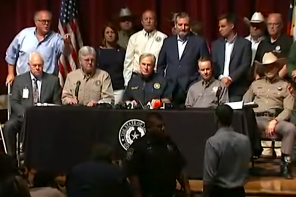As Julie documented earlier today, the Washington Post failed to do its homework for the story on Sharron Angle and Christian Reconstructionism. It’s not like Reconstructionism is a club with members and Sharron Angle doesn’t know the secret handshake, therefore she can’t possibly be a member. Christian Reconstructionism is a formidable theo-political movement that has shaped the modern religious right, and which dovetails philosophically with a significant segment of the tea party movement.
It’s no secret conspiracy — in fact, it’s such an ordinary component of our political culture that a lot of people, including those whose views have been shaped by it, don’t even take note of it.
If you’re not convinced that Christian Reconstructionism is so intertwined in our culture and politics that many people don’t notice it, consider this: during the health care reform debate a small group of Christians — who don’t admit to being Reconstructionists, but are clearly tied to them — succeeded in convincing Democrats that religious freedom required that they be exempted from the individual mandate. These Christians belong to health care sharing ministries — they cover each others’ health care costs — because they believe that biblical principles, not government regulation, provide for their needs. When NPR ran a story on these health care sharing ministries, it portrayed them as Christians helping each other, but neglected to, as legal scholar Marci Hamilton said of the legislators who agreed to the religious exemption, “look under the rock.”
Likewise Gun Owners of America is frequently portrayed as a more conservative, hardcore gun rights group than the National Rifle Association. But as Julie and I reported in our piece on the GOA’s ties to Christian Reconstructionists, these gun advocates derive their views from a reading of the Bible derived directly from Reconstructionism: that the federal government has exceeded its God-ordained authority, and state-level militias are needed to defend their citizens from overreaching feds. These gun advocates — who support the candidacies of Angle and Rand Paul, who similarly have been influenced by Reconstructionism — believe that the Second Amendment right recently recognized by the Supreme Court was created by God, not the founders, and were appalled that Elena Kagan had never thought about whether the right to carry a gun was a divine one. Republican Senator Charles Grassley asked her the question — one that comes straight out Reconstructionist thinking on the godly, rather than human, roots of our constitutional rights.
Star Parker, a religious right celebrity touted by the John Birch Society, the Republican candidate for the congressional seat in California’s 37th district, and an exemplar of the religious right’s efforts to reach African-American voters, is an expressed admirer of Rushdoony. When she approvingly cited his theology to the crowd assembled at the Values Voters Summit a few years ago, no one blinked an eye.
That’s because Christian Reconstructionism isn’t a secret conspiracy waiting to be unearthed by enterprising bloggers. It’s an essential piece of the modern conservative movement, as long as the religious right continues to be an essential piece of the modern conservative movement that happily co-exists with libertarianism. Many reporters and observers believe that libertarianism to be secular, but it is not, at least for the religious right. It is rooted in the Christian Reconstructionist belief that the Bible, not government created and run by humans, should dictate the workings of our society and culture.
Of course not all conservatives are happy with the Reconstructionists in their midst, just as William F. Buckley was disconcerted with their ally Birchers. During the 2008 presidential campaign, none other than Robert Novak fretted that Reconstructionists comprised Mike Huckabee’s base.
When we write about Christian Reconstructionism here at RD, it’s not to cause a panic over some sort of secret conspiracy underlying the religious right or the conservative movement. It really is, as Julie observed, completely out in the open. Many people influenced by Reconstructionism don’t like to admit it — they don’t want to be associated with Reconstructionist thinking that approves of slavery or the death penalty for homosexuals. But they are, nonetheless, deeply guided by the biblical law idea; after all, if America was, as they believe, founded as a Christian nation, how far is the leap to biblical law? But no, it’s not a secret society trying to elude detection. At the same time, though, it’s hardly inconsequential. It is such an essential piece of the religious right that you could not seriously be a student of American politics without recognizing its role and reach.




